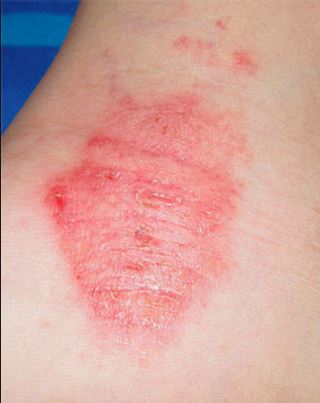Eczema is a common skin condition affecting people of all age. The affected skin becomes dry, red and itchy. Sometimes, these affected areas of skin can become cracked, weepy and then scab over.
Eczema can be well controlled with appropriate skin care and topical cortisone treatment will need to be continued for many years.
Eczema can affect any part of body. Common areas affected are at flexural areas such as elbows, wrists, knees and ankles. Certain occupations involving hands washing, cleaning, handling tools and etc can cause Eczema rash on palms and fingers. In severe form of Eczema, the rash can cover the whole body. In rare situation, severe Eczema covering the whole body can cause Erythroderma (intense and widespread reddening of the skin due to inflammation causing skin to peel off in scales or layer which can sometimes be life threatening).
The cause of Eczema is unknown. If a person has hay fever and Asthma, he/she is more likely to have Eczema which is known as atopic allergy. Certain conditions can trigger off Eczema such as overheating, dry skin, irritation from chemicals such as soap, detergents, fabrics, food allergies, dust mites, pollens, animal dander, virus and other infections.
It is utmost importance to keep skin moisturised with moisturiser which to be applied daily or twice daily. Good moisturisers such as Aqueous cream, Sorbolene and Dermeze emulsifying ointment can be purchased from pharmacy. Patient with Eczema is to have short showers of 5 to 10 minutes with water only and not to use soap as it will dry out the skin. Immediately, after shower, a towel used to wipe dry whole body and then moisturiser applied straight away will keep the skin moist.
Cortisone cream is the mainstay treatment of Eczema to keep it under control. Depending on the severity and location of Eczema, different strength of cortisone creams will be prescribed by doctor. Cortisone cream does not adversely affect children growth, adolescents and adults in term of health condition. In severe form of Eczema when topical cortisone is unable to control Eczema, immunosuppresant medications such as Methotrexate, Cyclosporin and Imuran can be used. However, theses medications have side effects and will require regular blood tests to check on liver and kidney functions. There is new biologic agent such as Dupilumab and etc available to treat severe Eczema. However, this will require dermatologist to prescribe the biologic agent.
Most people with Eczema do not have alllergy to food. To test if patient has any particular allergy to food, patient will need referral to allergist to have skin patch testing to identify what food he/she is allergy to. This test is only suitable for adolescent and adults. For children, no test is available but consideration of referral to paediatrician or allergist for further opinion.
For futher information, please visit resourceful websites in Dermnet NZ and RCH.
